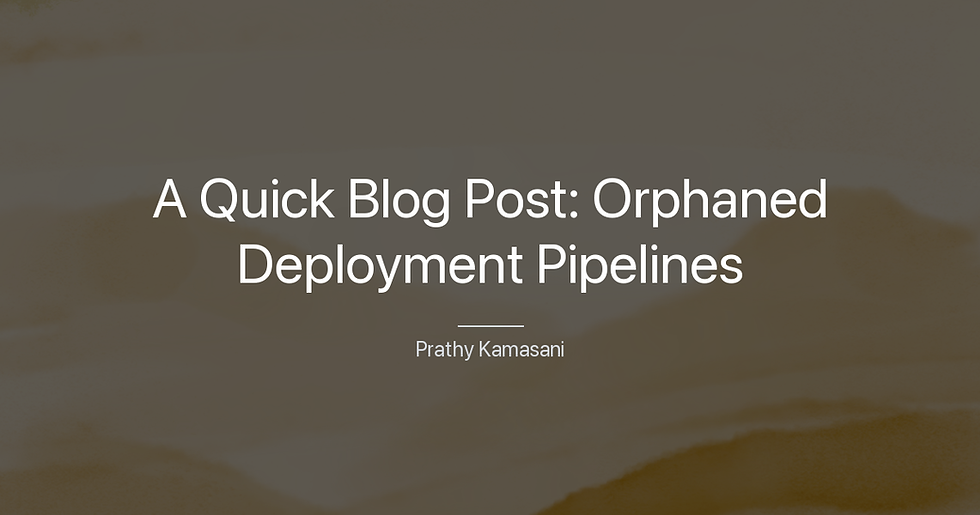Efficiently Moving Items Between Workspaces with Fabric CLI
- Prathy Kamasani

- Nov 3, 2025
- 3 min read
Updated: Nov 14, 2025
Many people think of Fabric CLI as a developer tool for use on a local machine, and understandably so, since that's the typical view of any command-line interface (CLI). However, what if you're already immersed in a notebook, examining capabilities, scripting your solution, and you prefer not to change tools? This is precisely why I prefer Fabric CLI over any others I've used.
My Problem:
I have way too many items in a folder under a particular workspace. I need to move or copy only those items into a separate, dedicated workspace. Bonus, if I can create a folder and keep all these items in that folder.
Step 1: Authenticate Fabric CLI Inside a Notebook
First step Authentication. I was initially using a service principal, but Sandeep demonstrated how he was using it differently with a token, so I updated the code.
Code for this step:
# Install Fabric CLI if not already installed
# %pip install ms-fabric-cli --quiet
import os
import notebookutils
# Step 1: Authenticate and set environment variables
# This uses the token available within the notebook context
# and makes it available for all fab CLI operations
token = notebookutils.credentials.getToken('pbi')
os.environ['FAB_TOKEN'] = token
os.environ['FAB_TOKEN_ONELAKE'] = token
print("Authentication tokens set for fab CLI")No login prompts. No switching tools.
Step 2: Define Workspaces and Folders
We define the workspace and folder names to use throughout the script.
Code for this step:
# Define source and target workspaces and folder names
source_workspace_id = "41706d46-7c89-45c1-b56f-74aca7d99000"
target_workspace_id = "bf4c8872-f858-4359-8221-df042403c3f8"
source_folder_name = "Linkedin"
target_folder_name = "Linkedintest"
# Resolve workspace names for readable CLI paths
import sempy.fabric as fabric
source_workspace_name = fabric.resolve_workspace_name(source_workspace_id)
target_workspace_name = fabric.resolve_workspace_name(target_workspace_id)
print("Source workspace name:", source_workspace_name)
print("Target workspace name:", target_workspace_name)Step 3: Get (or Create) Folder IDs
To work with folders, we need their internal IDs. This function fetches the ID for a given name, or creates the folder if it doesn't exist.
Code for this step:
import json
import subprocess
def get_folder_id(workspace_id, folder_name):
cmd = f"fab api -X get workspaces/{workspace_id}/folders"
result = subprocess.run(cmd, shell=True, capture_output=True, text=True)
data = json.loads(result.stdout)
text = data.get("text")
folders_json = json.loads(text) if isinstance(text, str) else text
folders = folders_json.get("value", [])
for f in folders:
if f.get("displayName") == folder_name:
return f.get("id")
return None
# Retrieve IDs or create the target folder if needed
source_folder_id = get_folder_id(source_workspace_id, source_folder_name)
if not source_folder_id:
raise Exception(f"Source folder '{source_folder_name}' not found")
target_folder_id = get_folder_id(target_workspace_id, target_folder_name)
if not target_folder_id:
payload = json.dumps({"displayName": target_folder_name})
cmd_create = f"fab api -X post workspaces/{target_workspace_id}/folders -i '{payload}'"
result_create = subprocess.run(cmd_create, shell=True, capture_output=True, text=True)
resp = json.loads(result_create.stdout)
target_folder_id = resp.get("text", {}).get("id")
if not target_folder_id:
raise Exception(f"Failed to create target folder '{target_folder_name}'")
print(f"Created target folder '{target_folder_name}' with ID: {target_folder_id}")
else:
print(f"Target folder '{target_folder_name}' found with ID: {target_folder_id}")
print(f"Source folder ID: {source_folder_id}")
print(f"Target folder ID: {target_folder_id}")Step 4: List Items in Source Folder
Here we retrieve all the items inside the source folder, so we know what to work with.
Code for this step:
cmd_items = f'fab api -X get "workspaces/{source_workspace_id}/items?folderId={source_folder_id}"'
result_items = subprocess.run(cmd_items, shell=True, capture_output=True, text=True)
items_data = json.loads(result_items.stdout)
text_items = items_data.get("text")
inner_items = json.loads(text_items) if isinstance(text_items, str) else text_items
items = inner_items.get("value", [])
# Filter only items that belong directly to this folder
filtered_items = [item for item in items if item.get("folderId") == source_folder_id]
print(f"Found {len(filtered_items)} items in source folder")Step 5: Check Before You Copy
This utility function helps prevent duplicates by checking if an item already exists in the target workspace.
Code for this step:
def check_item_exists(path):
escaped_path = path.replace(" ", "\ ")
cmd = f'fab exists "{escaped_path}"'
result = subprocess.run(cmd, shell=True, capture_output=True, text=True)
stdout = result.stdout.strip().lower()
return "* true" in stdoutStep 6: Copy and Patch
This section performs the main task: copying the item and placing it in the correct folder of the destination workspace. The patch piece needs more testing. It was a bit of hit and miss.
Code for this step:
for item in filtered_items:
item_name = item.get("displayName")
item_type = item.get("type")
src_path_raw = f"{source_workspace_name}.Workspace/{item_name}.{item_type}"
tgt_path_raw = f"{target_workspace_name}.Workspace/{item_name}.{item_type}"
if check_item_exists(tgt_path_raw):
print(f"Skipped (exists in target): {item_name}")
continue
if not check_item_exists(src_path_raw):
print(f"Skipped (missing in source): {item_name}")
continue
cmd_copy = f'fab cp "{src_path_raw}" "{tgt_path_raw}"'
proc = subprocess.Popen(
cmd_copy,
shell=True,
stdin=subprocess.PIPE,
stdout=subprocess.PIPE,
stderr=subprocess.PIPE,
text=True
)
stdout, stderr = proc.communicate(input="Yes
")
if proc.returncode != 0:
print(f"Copy failed: {item_name} ({stderr.strip()})")
continue
get_items_cmd = f'fab api -X get "workspaces/{target_workspace_id}/items?filter=displayName eq \'{item_name}\'"'
get_result = subprocess.run(get_items_cmd, shell=True, capture_output=True, text=True)
get_json = json.loads(get_result.stdout)
items_list = get_json.get("text", {}).get("value", [])
if not items_list:
print(f"Item not found after copy: {item_name}")
continue
copied_item_id = items_list[0]["id"]
patch_body = json.dumps({"parentFolderId": target_folder_id})
patch_cmd = f'fab api -X patch workspaces/{target_workspace_id}/items/{copied_item_id} -i \'{patch_body}\''
patch_result = subprocess.run(patch_cmd, shell=True, capture_output=True, text=True)
if patch_result.returncode == 0:
print(f"Moved '{item_name}' to folder '{target_folder_name}'")
else:
print(f"Failed to move '{item_name}' to folder")Every item gets checked, copied, confirmed, and moved. Neat.
Here's the full working version: GitHub Repo
Let me know if this helps or if you've got other CLI hacks you use inside Fabric notebooks 👩🏾💻



Comments